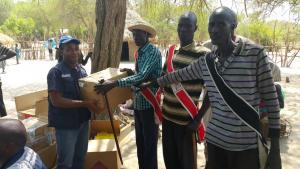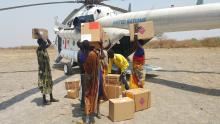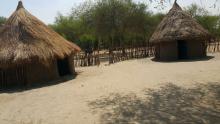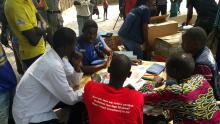WHO and partners in collaboration with the Ministry of Health investigate the suspected diarrheal diseases outbreak in Kuardeang, Fangak South
12 March 2019, Juba – The Ministry of Health of South Sudan, World Health Organization, and partners undertook a ground breaking joint mission on 11 March, 2019 to investigate the suspected diarrheal diseases outbreak in the remote and difficult terrain of Kuardeang payam in Fangak South.
A multi-disciplinary team comprising of clinicians, epidemiologists, WASH, laboratory, risk communication experts conducted epidemiological, laboratory, and environmental investigations to determine the magnitude of the suspected outbreak, the size of the population at risk, identify factors fueling the spread, and initiate response and control measures to prevent further spread.
Over 300 suspected cases of acute watery diarrhoea and bloody diarrhea with two deaths have been reported in Kuardeang payam between week 4 and week 8 of 2019. Implementing partners on the ground namely Trust Organization for Community Aid Agency (TOCAA) and CMA launched a rapid response to support the State Ministry of Health and collected two laboratory samples for investigation which tested negative for cholera. However, given the limited capacity of the implementing partners on the ground, a national level multi-disciplinary team intervened for a more robust response.
The joint mission established that the community with a total population of 6,000 people live in seven hard to reach villages, have shortage of safe drinking water and limited access to essential health care services. The community reported that the last Polio and measles vaccination campaign was provided two years ago by MSF.
According to the ‘Sultan’ (local community leader) and the community members, the diarrhoeal diseases are due to lack of safe drinking water and yet they have no solution. The ‘Sultan’ expressed his appreciation to the team and said, “the women are jubilating because this is the first time an airplane has landed here.’ He hoped that the team would provide a lasting solution to their health problems mainly malaria and diarrhoea.
The team collected seven stool and three water samples from the water sources and conducted health education on the causes of diarrheal disease, prevention, and control. Plans are underway to engage the Health, WASH, and Logistics clusters to implement the follow up interventions. These interventions will target the underlying risk factors to interrupt transmission.
Commenting on the current situation, the World Health Organization Country Representative, Dr Olu Olushayo, stated that the burden of communicable and noncommunicable diseases can be reduced and health outcomes improved by strengthening community capacities to mitigate health risks through adoption of preventive and promotive measures. He further reaffirmed WHO’s commitment to supporting South Sudan to promote Universal Health coverage, protect its people from health emergencies and to ensure that more people enjoy better health and wellbeing.
To support the response, WHO delivered medical emergency kits, cholera investigation kits, and WASH supplies to Kuerdeang PHCU adequate for three months including 6 hand sprayer pumps, disposable gloves, and water treatment, testing chlorination kits. In addition, WHO provided Integrated Disease Surveillance Response (IDSR) tools to strengthening the surveillance system, and health educational materials.
Although the surveillance system has been reporting alerts of diarrhoeal diseases, South Sudan has been cholera free since the end of its longest and largest cholera outbreak in December 2017. With the coming of the rainy season, efforts are underway to vaccinate 1,662,181 people at risk against cholera in transmission hotspots as a precautionary measure. Home hygiene and environmental control strategies are also being promoted through the Boma Health Teams and other community based structures. All these interventions are articulated in the draft National Cholera Control Plan for South Sudan (2018-2022) that is aligned to the Global Roadmap for cholera elimination by 2030.
We acknowledge the generous support from South Sudan Humanitarian Fund (SSHF), United States Agency for International Development (USAID), European Union Humanitarian Aid (ECHO) in the provision of humanitarian emergency response services in South Sudan.
Tel : +211923362401
Email: wamalaj [at] who.int
Tel: +211954794603
Email: sokemawufreemana [at] who.int
Communication Officer (Health Promotion/Risk Communication focal person)
Mobile: +211 (0) 921647860
Email: luwagal [at] who.int
Medical Mobile Team/WHE
Email: odraw [at] who.int
Telephone: +211 929 246 505



